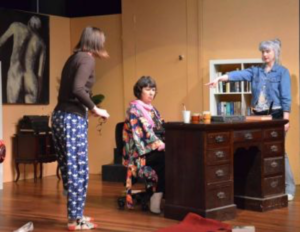By Joanna Murray-Smith. Lane Cove Theatre Company. The Performance Space, St Aidan’s, Longueville. Feb 8 – 23, 2019.
Reviewed : 9 February 2019

This almost anti-feminist play is one of the Australian plays listed on the HSC Drama Syllabus, so it can be expected that it will attract some local year 12 students – as it did on opening night. The five about-seventeen-year-olds in front of us were the most enthusiastic of a very appreciative audience. The production obviously met their expectations of the play and the characters – and I’m sure director Jess Davis was thrilled by their immediate responses and their post-play comments.
Davis has taken playwright Joanna Murray-Smith’s foreword to heart, finding the farcical elements of the play in a fast-moving production that accentuates the “quick wit, big ideas and ridiculous reveals” created by a writer who is able to comment on the changing phases of feminism through female characters that are strong, out-spoken and, as Davis says in her program notes, “carry the action with thought and input” unlike the “underwritten female characters” created by some male Australian playwrights.
The action centres around Margot Mason, an “admired/ridiculed” radical feminist, obviously based on Germaine Greer and her late twentieth century cohort of female activists. Margaret Olive takes on the challenge of this role, that is at once strident feminist and ageing author, living alone in an isolated house where she strives to find a key into her next book
. . .faithful to the satirical wit and intelligence of Murray-Smith’s writing – and her actors bring to their roles the energy and boldness the characters deserve.
Davis and Olive hit the ground running with a long, one-sided telephone conversation with her publisher that introduces Mason and the play. They make it loud and punchy, highlighting both Margot’s arrogant conceit and the coarse language and one-liners that set the tenor and pace of the production. Olive obviously relishes Margot’s fire, and the roller coaster of egotistic highs and denigrating lows she rides – even though handcuffed to a desk through much of the action.

Lib Campbell is vivacious and expressive as failed student Mollie, who is determined to make Margot pay for her mother’s suicide and her own lack of self-esteem. Campbell is always in character, finding in words, actions and immaculate timing, the dilemmas that drive Mollie, the complexity of the character suggested by Murray-Smith’s words … and Davis’ zany vision of her.
Equally striking is Zoë Crawford as Margot’s daughter, Tess, a fraught mother of three who has been undermined by Margot’s expectations and rejection. Crawford plays Zoë withsophisticated insight and poise using carefully timed pauses and comedic timing to reveal even more depth to the character than the words she speaks. . . . . .
Review continued in Stage Whispers magazine